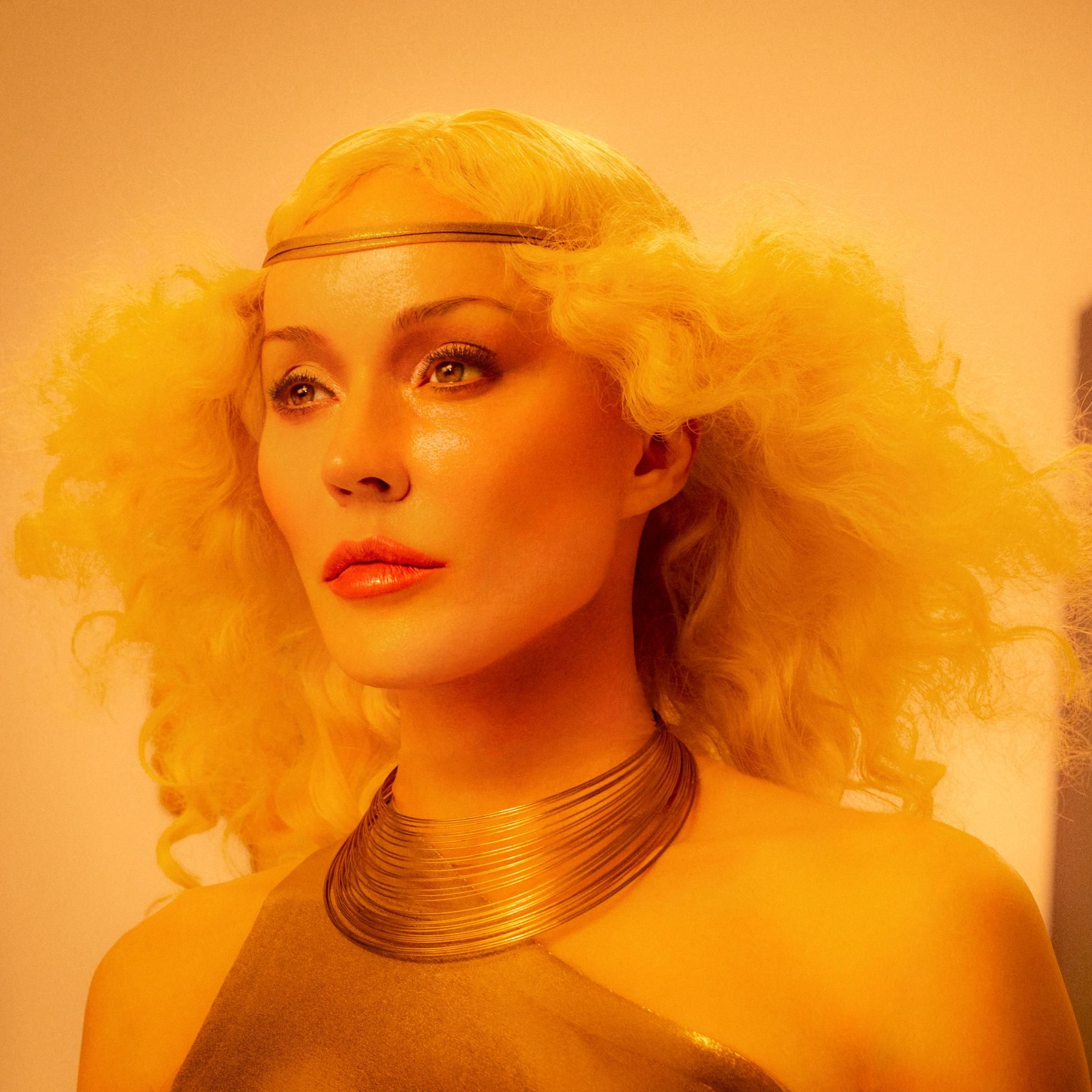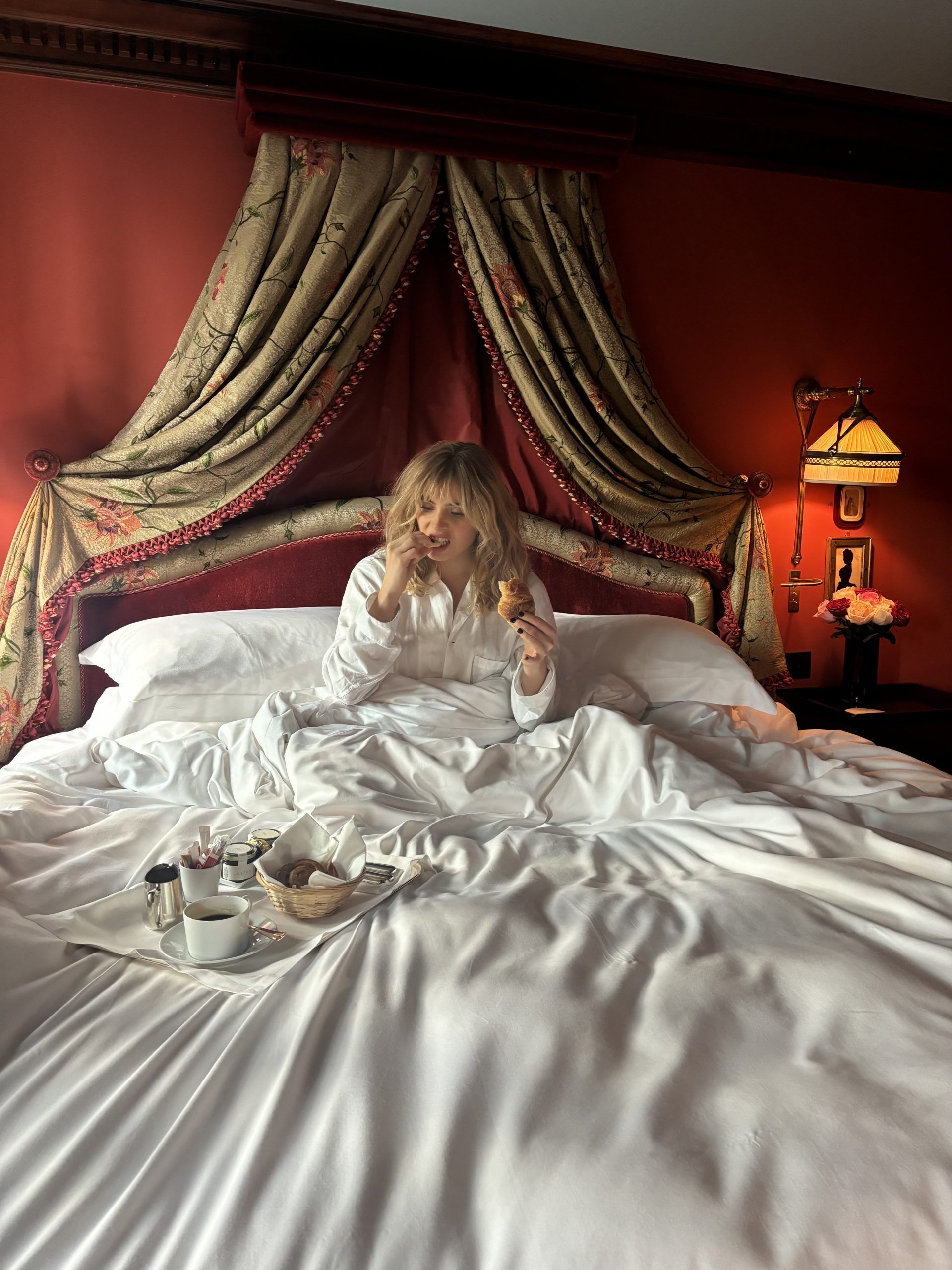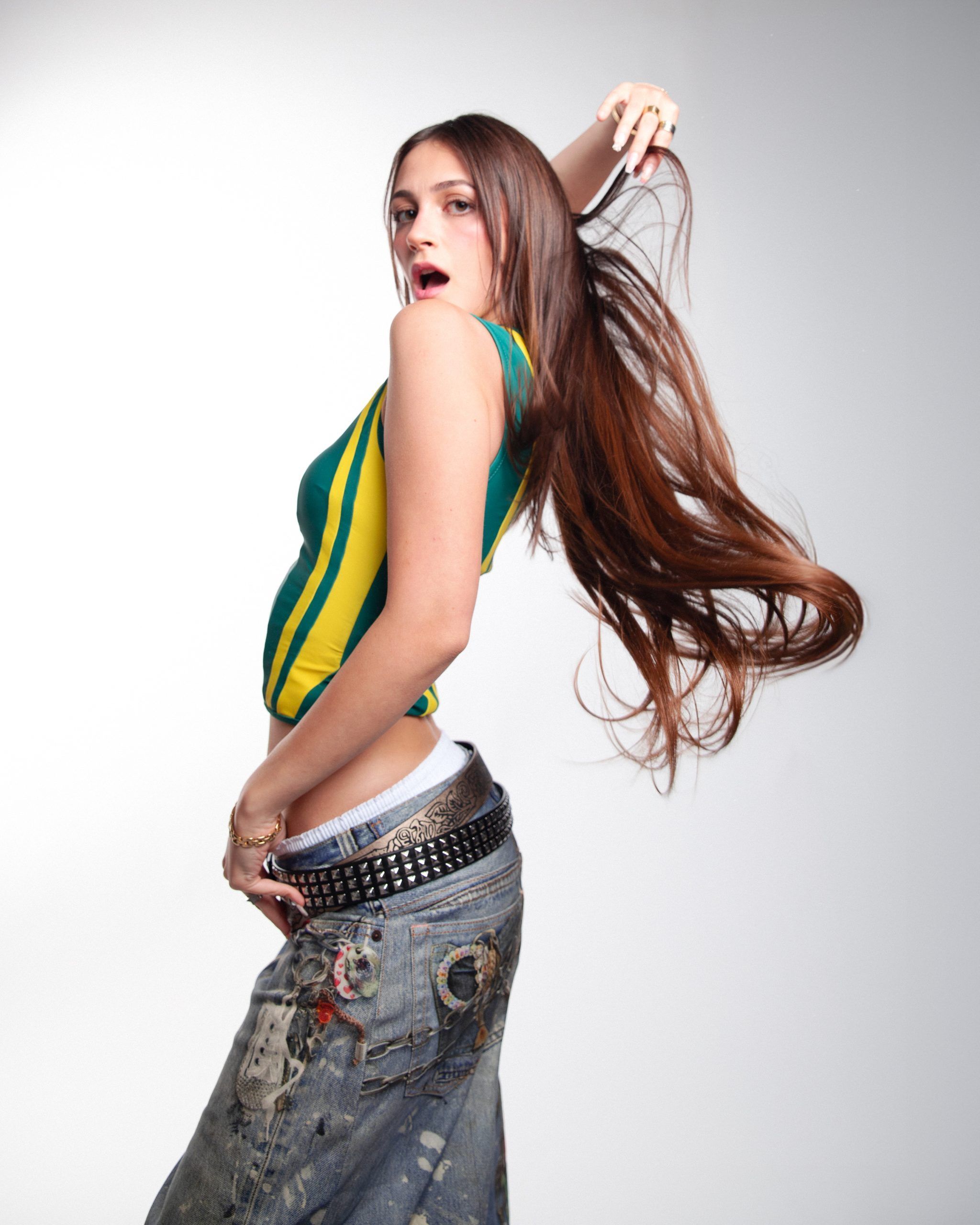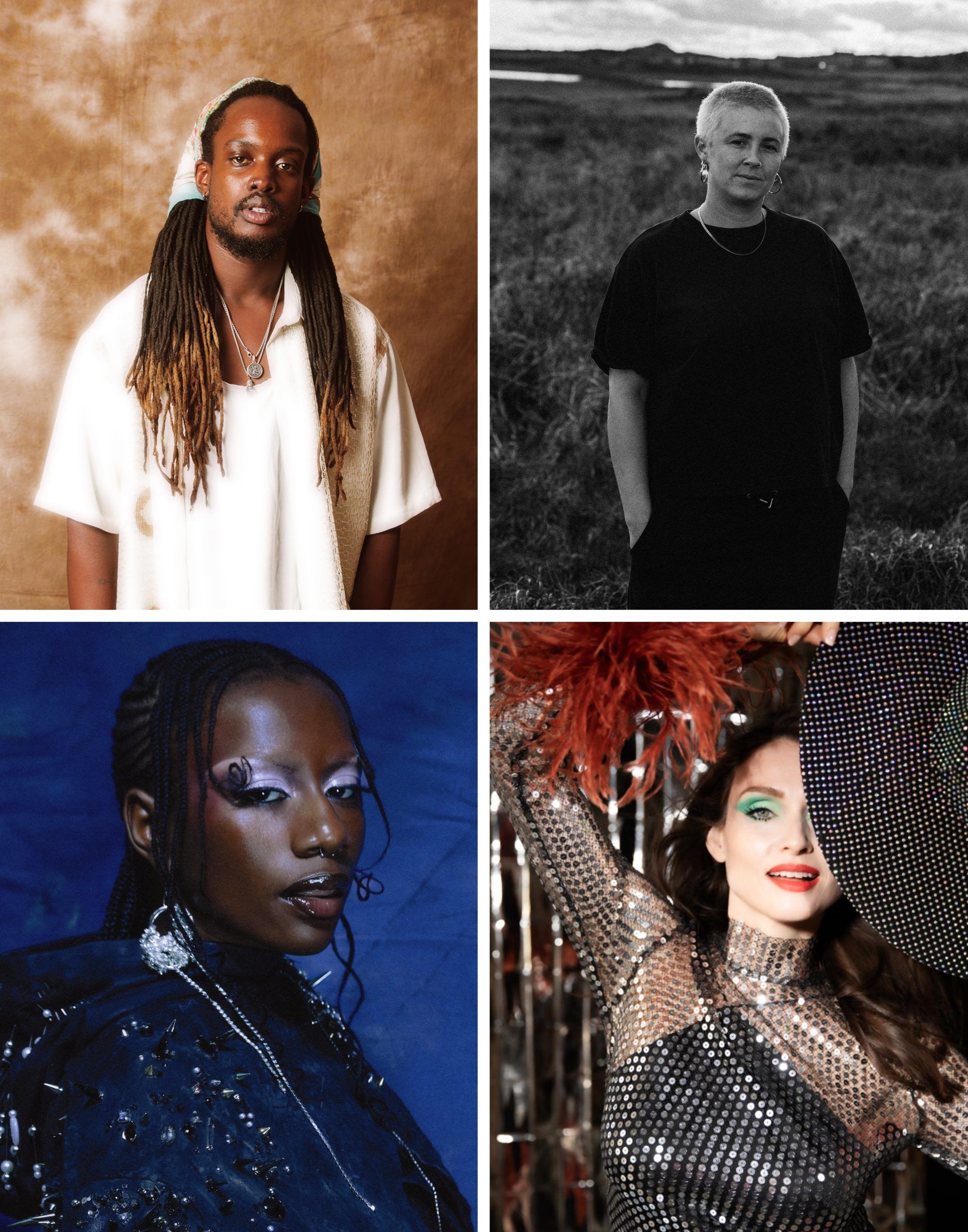A true renaissance figure, Daphne Guinness’ career spans a variety of creative fields, from the avant-garde realms of fashion and film to the intricate nuances of music. With an artistic journey marked by bold experimentation and fearless exploration, she has carved out a unique niche that defies conventional categorization.
Through the lens of her latest album, Sleep, she explores themes that resonate deeply with contemporary experiences, drawing on personal reflections and broader cultural observations. The album stands as a statement, encapsulating Daphne’s worldview and her approach to creativity in a world overwhelmed by noise and distraction. Her approach to creativity is revealed as one that embraces risk, immerses deeply into new mediums, and constantly seeks to challenge and expand the boundaries of what is possible. In discussing Sleep, Daphne eloquently articulates how the act of dreaming and sleeping becomes a metaphor for creativity and new world-building. It is through this quiet, introspective process that she finds the clarity and vision needed to navigate and make sense of the chaotic, noisy world around us.
In conversation with 1883 Magazine, Daphne Guinness shares her thoughts on creativity, creating Sleep, the importance of taking risks, and the continuous quest for artistic authenticity.
Your latest album, Sleep, is described as a departure from your previous works. Can you delve deeper into the thematic and sonic evolution that listeners can expect from this album compared to your earlier releases?
I would say it’s a continuation, but yes, maybe a departure. I always use different sonic elements in my work, but this is probably more of a blend of the future and the past in the same thing. I recorded it with a real band and, a few months later, it really grew from there. I believe that I learned more with each album I did. For me, walking into a studio and having an idea is a learning curve. If I didn’t think I was going to learn something new in what I did, I would give up. If I think I could improve on things, for me, it’s an education.
Is it safe to say that you are a keen believer in the fact that there’s no age for learning?
No, absolutely not. I’ve been told that I’ve got something called a beginner’s mind, which is where I wake up in the morning and think, “What am I going to learn today?” If I thought I knew it all, I’d give up. So many jaded people around think that they know it all, which just isn’t true. At this level, on this album, I feel maybe that I’ve got to first base at the Himalayas; I haven’t reached the top at all. I think there’s a long way to go, so I still feel like I’m a beginner.
I think someone who creates something and puts it out in the world always feels there’s something more to add or that it’s maybe incomplete, so I completely get where you’re coming from.
Yeah, exactly. This album is a real blend of that learning. It’s very difficult for me to quantify this because, being me, it’s difficult to be objective about myself. I was trained as a classical singer and trained in the classical sense of the word, but thank goodness, not too much. I have enough theory and enough vocal training to be a classical singer, but I did not go all the way. The whole four years where I think that would have been trained out of me, my imagination would have been more perfect as a singer, but I probably would have lost my imagination.
Makes a lot of sense actually. The single “Volcano” from this album has been specifically noted for its intriguing blend of spy movie imagery and diverse musical elements. Can you please elaborate on how these influences came together to shape this song?
Oh, “Volcano.” Funnily enough, I wrote that song quite a long time ago and I just said whatever came into my head, which was sort of me on a train, which happens in north Germany. It is sort of based on the truth in a way. I’m always observing the people around me. My upbringing was very much a real mixture of different people and different literature. There was very much the literature on my father’s family, plus the intelligence area of the other side of my family.
I suppose I’m a mixture of both, and that’s why I feel that I was always very good with binary code and abstract mathematics. I’m not good at times tables or division, but sort of when you get to algebra, I understand because that’s sort of artistic. That’s completely different. If you have one microphone and one glass, that’s x and y. That is how I quantify it. I suppose because I’m a musician and I guess, an artist, an abstract idea forms in my head and if I can visualise that and I understand how that works, that’s voila for me. I wish I could do it all over again.
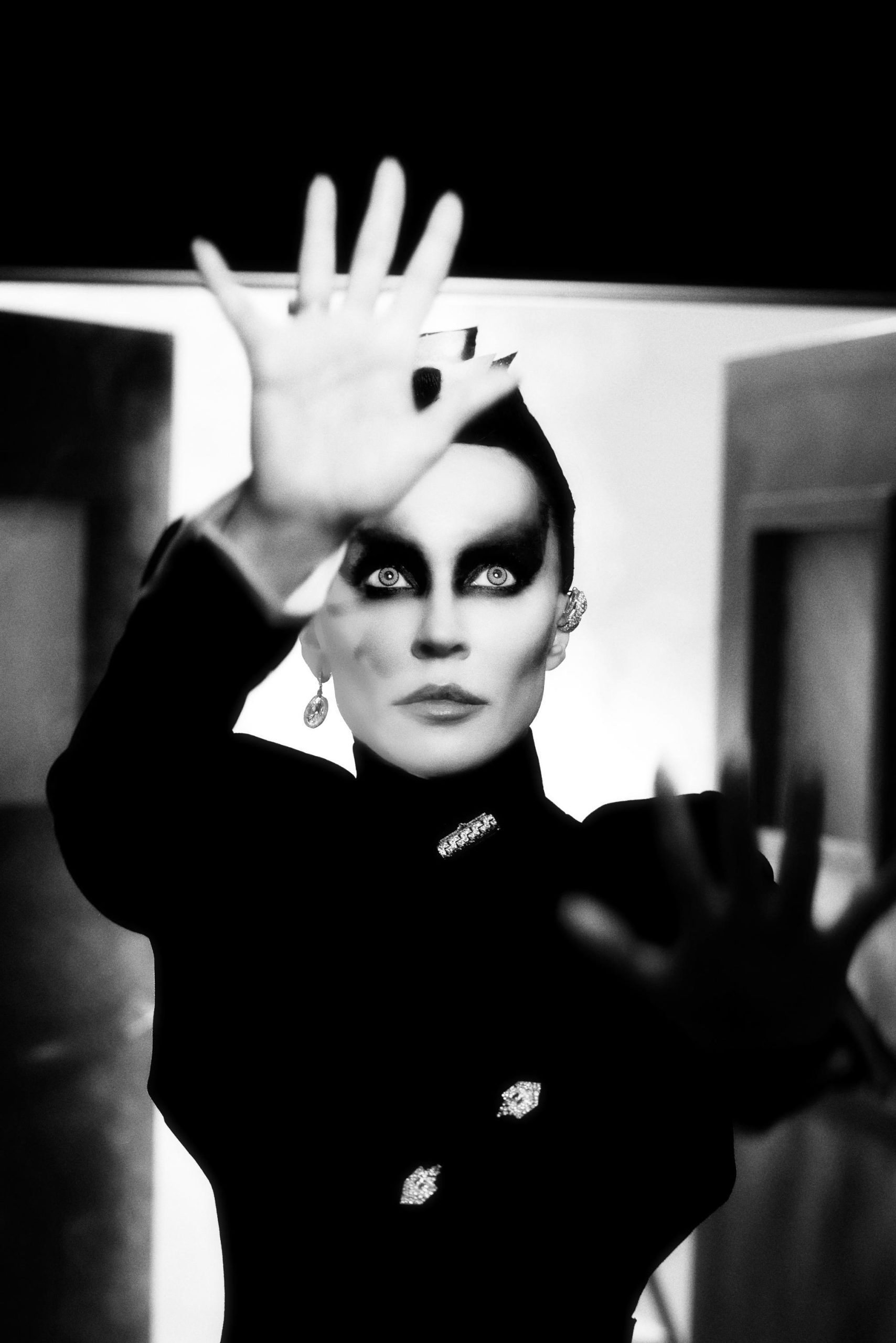
Since we have been talking about abstract mathematics, I will give you an extension of that as a question. In this album, you have combined abstract and unconventional sounds along with experimental techniques. Can you give specific examples of these approaches and how they contribute to your overall artistic vision for the album?
The one that springs to mind first is the back cracking or the sounds of my neck and my hip and my back being cracked by my chiropractor that was incorporated into the drums. My life is a strange thing. I have a studio life where I am a solitary figure, but when I actually work, I turn into a circus performer. This is where all sorts of accidents happen. To give you an example, on “Volcano,” I ruptured my disc. One has to go through nine car crashes in a row where you are being thrown forward against an airbag. Since I do all my own stunts, which is probably unwise in the extreme, but that’s just the way I do it, you know, and especially with my friend David Chapelle, who I’ve been working with for 25 years. We do everything for real.
Spoken like a true artist, I must say.
Well, you know, unless you’re ready to face the abyss and take a risk, there’s no point trying to pretend that you don’t. It changes what you do, and you have to kind of do that. I mean, I’ve done some downright very, very dangerous things in which I could have been dead many, many times. But, you know what, anything to make the picture look all right. So I will go to the extremes of everything, sort of. I can stand in the same position for 12 hours and not move. And on a cliff, you know, with a huge drop behind me, I will do that, but I’ll do anything to get the frame. Since I have done this so many times, it is imprinted in my DNA and has changed my physical structure.
I must say that, upon looking back, it’s given a lot of people who’ve worked around me a reason to walk out, apart from David. They can’t handle the fact that I do these things. You know, when you’re in the room and you have to do it, and it’s anything; whether it’s a song, whether it’s a piece of literature, I think you have to do it because, you know, you will have a breakthrough. Yes, you may have to go to the doctor afterwards. Yes, you may have to have some physical therapy. But you know what? That’s all right. Even though my work ethic may be a little extreme, I’m quite strong. Again, it’s the muscle memory and it works beautifully for me.
I actually definitely agree with that, and it actually brings me to my next question, and since you also mentioned David, it is kind of about him. This album seems to convey layers of symbolism as well as visual storytelling. Can you unpack some of the underlying themes and messages portrayed in the work you’ve done with David, particularly regarding its exploration of the fashion industry’s darker aspects?
We all know about fashion’s darker aspects. Namely, they don’t have a sense of humour or they take themselves too seriously, and it’s not that difficult. David and I were sort of the black sheep of the fashion industry because, you know, David’s done a lot of fashion shoots, and he is the master of light. He is, I would say, the greatest living director in the world. I mean, he is physically involved. That’s why it’s great working with him because he is physically invested as much as the talent. He really makes sure that everything is perfect. I had the same relationship with McQueen.
I’ve had a series of good relationships with very, very few artists who understand that it’s a risk to do anything. If you’re going to do it, you’ve got to do it correctly. Otherwise, go home. We have been doing this for years, but in various shoots, he will add details as a subtext. He thinks of things as an immersive experience.
As a follow-up to that, since you mentioned McQueen, you have been described as a cultural icon with a storied history, collaborating with visionaries like McQueen and Karl Lagerfeld. How have these influential partnerships shaped your artistic identity and contributed to your evolution as a musician?
Well, I was always a musician. I never really felt that I was part of the fashion world. It was always people like Karl that kept me close enough. We would have this sort of play between ourselves, and I remember when he said, “We seem to be turning into each other” at some points. A friend of mine said to me, which is something that Karl had said at some point, that the first person he thought of when he designed a collection was me, which was very, very flattering, and I didn’t know until recently, but there it was. It was the same with McQueen, but with McQueen, I was with him; we’d brainstorm ideas together.
It was all a huge kind of misunderstanding that I went into music. I mean, obviously, I was a musician. I was going to do a cover of a Dylan song for the death of my brother, and my friend, who was a hippie, never turned up to do the guitar. So I was so embarrassed. Sitting in front of an Irish producer one day turned into two days, and still, my guitarist didn’t arrive. And then I just started making stuff up. It was just the first plunge in, and then after the first song, it was very, very easy to come up with the rest of it. So I just started singing.
I sent a smoke signal up from where I was in the middle of Ireland without very much reception, and Bowie, being Bowie, picked up the signal and convinced Tony to produce me, Bowie was the shadow producer on my first album. So there it is!
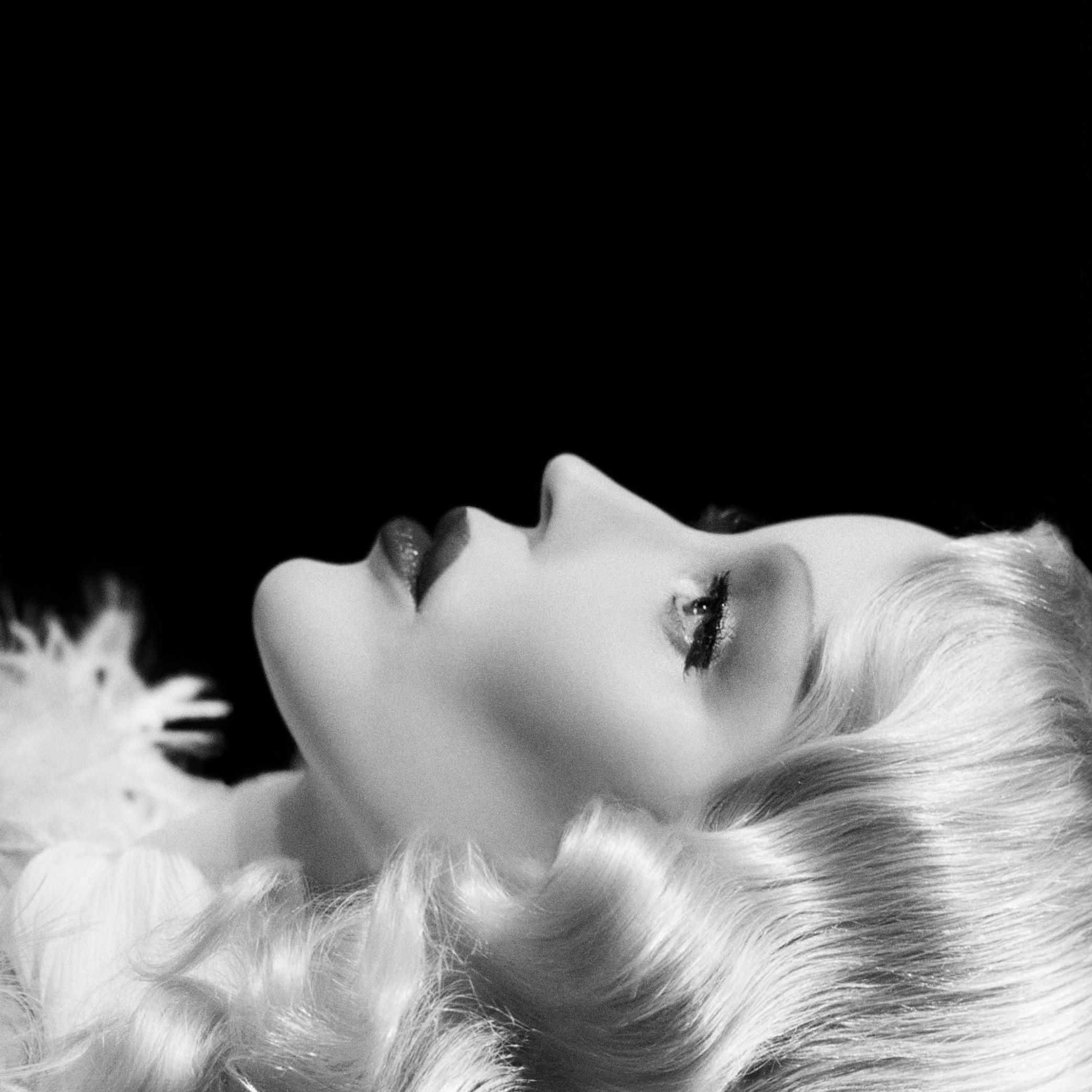
That was very, very interesting. You keep mentioning these names, and I have a follow-up for all of them. So, David Bowie, from what I have read about you, did play a significant role as a mentor in your journey, especially your musical journey. Can you share any particular insights or advice he shared that influenced your creative process or the direction of your music?
Well, first of all, I would say, my accent changes a lot. I have a musical ear, but by the time I’d spent many, many years in Ireland, I’d become completely Irish, as they say. So, you know, he said, you’ve got to bring your accent back to you. Summon the energy to have an English accent. That’s great. You know, that’s what Nico did. Because my accent in a song sounds almost as German as an English person’s, I can vary my accent to whatever anybody wants, but the sort of enunciation and being able to articulate words and be able to, yeah, so you hear the s’s.
That was one of the things. Also, he and I would talk about operatic scores that we were into, and we had very, very similar experiences. As a literature fan, you would relate, but, I mean, the idea that we’d be reading the same book at the same time and being influenced by it was really comforting. I felt less lonely being with him because he understood. He understood the kind of niche areas that maybe I was interested in.
So your career has spanned various creative fields, from fashion to film. How do these diverse pursuits inform and influence your approach to music making, particularly in the context of “Sleep”?
I would say that it informs it all. Everything that you do informs the step that you make next. It’s difficult for me to articulate how that does to me, but it’s a kind of muscle memory. And it’s always terrifying to move into a new medium. But once you begin, then that’s really the first step, is going into the room and daring to do it. You have to dare. Absolutely. And you don’t know where you are for a long time. Writing a song is like, for me, as if you’re plunging yourself into a dark corridor where you don’t know where anything is. It’s pitch black, and you’re trying to navigate furniture or objects, and you kind of know where the walls are, but you’re trying to get through. And at the end of this dark corridor, it could be diving into a pool. Like at the end, someone turns on the lights, and you go, that’s what that was. You have to begin. You have no idea where it’s going; it’s like a hall of mirrors or a deep, dark cavern, and you’re in there and you have no idea. You just have to trust that the next note is going to be fine and you’re going to find a way out, and then suddenly, it’s like, wow, that’s what that was.
I think the one who does take that plunge does come up to the other side with all these amazing and varied experiences compared to someone who just stays in one place all their life.
Yeah, also without too many people. I mean, it’s a blessing and a curse in many respects, because if you have a lot of people from a record company dictating what you need to do or what is commercial or what is not commercial, what words you can use or what sounds you can use, it can get very complicated. If you have accountants leading the artistic vision, I’m not sure if that’s really where we want to end up the right way.
Makes sense. Now, beyond music, your diverse creative endeavours include film production, curation, and design. How do these varied pursuits intersect with your music-making process, and how do they influence each other in significant ways?
Well, one thing you missed from that is perfume. I do that as well. With me, you’re entering a world. It’s everything. It’s each sensory, you know, so it’s sound, vision, feel. Yeah, look. So that’s how it informs. And one plays off the other because you can’t. I mean, for me, I’m very attuned to every kind of— I suppose it’s just the way I was brought up.
Like all the different creative realms you’ve been surrounded by all your life.
Yes, absolutely and for me, I love going into things deeply, again, it’s the beginner’s thing. How much more can you discover to create an experience for the observer, listener, or just as a human entity?
So I, you know, with film, I started with— I wanted to know how many reels of film create how many seconds of moving images. This is years and years ago. So, you know, starting with analogue, going into digital, going into the editing, going into the light, going into all those sorts of basic things, because to me, that’s the fascinating part. It’s how everything works.
So in all of these collaborations, what do you look for when you end up delving into these collaborations? In, like, three words.
Light, form, and feel.
Coming back to Sleep. So, in what I have read, you mentioned that it encompasses your worldview at this moment. Can you elaborate on the personal and thematic reflections embedded within the album and how they relate to our experiences and perspectives?
Well, Sleep to me— I mean, the only way you can envision a new world is if you sleep. And you can dream up a new world in which to inhabit because there’s just too much noise. Too much noise. So as a child of surrealism, the only way I can dream a new world is by sleeping. I quite like it. Yes. There’s a lot of interference, a lot of noise, a lot of voices. The world hasn’t changed, I don’t think, for 10,000 years, with people being utterly ghastly to each other, and it seems we never learn. But I think in order to break that, you need to have structure, but you also have to have imagination, rules, and kindness. When I’m looking for a word, it’s because I’m hearing it in my head, but it’s often a note of music rather than being able to articulate it between languages if that makes sense.
Sleep is out now.
Interview Ishika Paruthi

